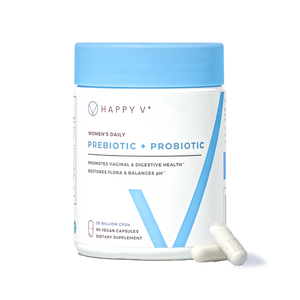- Fact Checked
- October 03, 2025
- 11 min read
Can You Get a Pap Smear on Your Period? Everything You Need to Know About Timing and Your Cervical Health
Table of Contents
Table of Contents
Scheduling a Pap smear isn’t exactly anyone’s idea of fun, and your period always seems to show up at the most inconvenient time. You might wonder, “Can I still have a Pap smear while I’m on my period?” The answer: sometimes yes, sometimes no. It all depends on a few key factors.
In this post, we’ll talk about what a Pap smear actually does, how your menstrual cycle can impact the test, and when it might make sense to reschedule. Most importantly, you’ll learn how to make the process as accurate and comfortable as possible — because your cervical health deserves care and clarity, not confusion.
This post is for informational purposes only and does not constitute medical advice. See full disclaimer below.
What Exactly Is a Pap Smear?
Before we jump into the nitty-gritty of how your period can affect your Pap smear results, let's quickly review what a Pap smear even is.
A Pap smear (or Pap test) is a simple but incredibly important screening tool that checks for abnormal cells on your cervix1. During the procedure, your healthcare provider gently collects cells from your cervix using a small brush or spatula, then places them into a special liquid that helps preserve the sample. This process (called liquid-based cytology) gives the lab a clearer look at your cells and can even be used for HPV testing2. These samples are then examined for any cellular changes that might indicate cervical precancer or early signs of cervical cancer.
The beauty of Pap smears lies in their ability to detect human papillomavirus (HPV) and precancers before they become serious health concerns3. When combined with HPV testing (called co-testing), this screening becomes even more powerful in protecting your reproductive health!4
The Million-Dollar Question: Pap Smears During Menstruation
So, can you get a Pap smear while menstruating? The short answer is: it depends!
While it's not impossible, there are several important factors to consider that might affect both the accuracy of your test results and your overall comfort during the procedure.
Light Flow vs. Heavy Flow: What Makes the Difference?
Light spotting or very light flow: Generally speaking, if you're experiencing only light spotting or a very minimal menstrual flow, your healthcare provider might be able to proceed with the Pap test. The small amount of menstrual fluid won't necessarily interfere with sample collection or cervical visibility.
Moderate to heavy flow: When you're dealing with a heavier menstrual flow, it becomes trickier. Menstrual fluids can potentially lead to sample contamination, making it harder for the lab to get clear, accurate results. Plus, excessive bleeding might obscure your provider's view of the cervix, affecting the quality of the cell samples they can collect.
Comfort Considerations During Your Pelvic Exam
Let's be real: pelvic exams aren't anyone's favorite activity, even on a good day, and having your period can add extra layers of discomfort. You might be dealing with:
- Painful cramps that make the speculum insertion more uncomfortable
- Increased sensitivity in your pelvic area
- General discomfort from menstrual symptoms
- Feeling self-conscious about vaginal discharge or odor
Your comfort matters, and accuracy questions aside, there's absolutely no shame in wanting to reschedule if you're not feeling your best! Just make sure you do reschedule your test and don’t choose to put it off for another year. Your health is too important.
Ideal Timing Within Your Menstrual Cycle
When it comes to your menstrual cycle, the best time for a Pap smear is typically 5-7 days after your period ends. This timing ensures:
- Clear cervical visibility for your provider
- Minimal chance of sample contamination
- Optimal comfort during your pelvic exam
- The most accurate test results possible
Other Factors That Can Affect Your Pap Smear Results
Your period isn’t the only thing that can influence how accurate a Pap smear is. In fact, several other factors can make it harder for your provider to collect a clear sample or for the lab to interpret your results. Here’s what to keep in mind:
- Yeast infections: These can change the cellular environment and make abnormal cells harder to detect5.
- Bacterial vaginosis: This common imbalance can cloud the sample and affect clarity.
- Sexually transmitted infections (STIs): Active infections may interfere with accurate readings.
- Unusual vaginal discharge: Extra discharge of any kind can make it more difficult to collect a clean sample.
These conditions definitely still require a visit to your gynecologist, though. In fact, prompt diagnosis and treatment are important. But if you’re experiencing symptoms, it may be best to reschedule your routine annual Pap smear and instead request vaginal swabs or other targeted tests to get the most accurate diagnosis.
When to Reschedule Your Appointment
Sometimes rescheduling is the smart move. Consider calling your healthcare provider to discuss timing if you're experiencing:
- Heavy menstrual flow that would significantly interfere with the procedure
- Severe menstrual cramps or pelvic pain
- Active infections like yeast infections or bacterial vaginosis
- Any infection-related bleeding between periods
Remember, your annual exam doesn't have to be derailed by your period. It might just need a little timing adjustment!
Special Situations: Post-Pregnancy and Post-Miscarriage
Life doesn't always follow our perfectly planned schedules, and that includes major life events like pregnancy and miscarriage. If you've recently given birth or experienced a miscarriage, special timing considerations apply when it comes to scheduling your Pap smear:
-
Wait at least six weeks after giving birth before having a Pap smear
-
Wait at least six weeks after miscarriage to allow proper healing
- Avoid getting a Pap smear during the postpartum period, as your cervical cells are still recovering and changing
For all of these, your provider might suggest you wait longer, depending on your unique situation.
The Importance of Regular Screening (Period or No Period!)
Here's the thing: while timing matters for optimal results, the most important thing is that you're getting regular Pap smears according to your recommended screening intervals.
Cervical cancer screening has dramatically reduced cervical cancer rates, and skipping screenings altogether is far riskier than having one during less-than-perfect timing.
Why Regular Pap Smears Are Non-Negotiable
-
Early detection saves lives: Pap smears can detect cellular changes years before they become cancerous
-
HPV monitoring: Regular screening helps track human papillomavirus infections
-
Peace of mind: Knowing your cervical health status reduces anxiety
- Preventing progression: Catching precancers early prevents them from developing into cervical cancer
Special Considerations for High-Risk Individuals
If you have a history of cervical cancer, abnormal Pap results, or other risk factors, your gynecologist might recommend more frequent screening. In these cases, don't let your period derail your important healthcare appointments. Instead, discuss alternatives with your provider.
Understanding Abnormal Pap Smear Results
What happens if you do go through with your Pap smear, even while on your period, and it comes back with abnormal results?
First, take a deep breath! An abnormal Pap result does not automatically mean you have cancer. In fact, most abnormal results are due to completely manageable conditions that have nothing to do with cancer at all.
What "Abnormal" Really Means
An “abnormal” Pap smear result means that abnormal cells were found on your cervix. This could indicate many things, including:
Benign causes (the most common!)6:
-
Infections like yeast infections, bacterial vaginosis, or sexually transmitted infections
-
Pelvic inflammation from various causes
-
Hormonal changes due to menstruation, pregnancy, or menopause
- Invalid test result due to factors like menstrual flow or insufficient sample collection
More serious (but treatable!) causes:
-
HPV (Human Papillomavirus) infection, which is incredibly common and usually clears on its own
-
Precancerous changes to the cervix. These develop very slowly and are highly treatable when caught early
- Early-stage cellular changes that need monitoring but aren't immediately dangerous
The Next Steps: Your Healthcare Team Has a Plan
When you receive abnormal results, your healthcare provider will walk you through the next steps based on the specific type of abnormal cells found.
They might suggest:
-
Repeat Pap Smear (3-6 months later): Many times, your provider will simply recommend waiting and retesting. This approach works well because many cellular changes resolve on their own, especially those caused by infections or hormonal fluctuations. It's like giving your body a chance to heal itself!
-
HPV Testing: Since HPV is responsible for most cervical cell changes, your provider might order specific HPV testing to determine if the virus is present and which type it is. This helps them understand whether your abnormal cells are likely to resolve on their own or need closer monitoring.
-
Colposcopy: Don't let this word intimidate you! A colposcopy is simply a more detailed examination of your cervix using a special magnifying device called a colposcope. Think of it as a high-powered magnifying glass that helps your provider get a better view of any changes to the cervix. During this procedure:
- You'll be positioned similarly to a regular pelvic exam
- Your provider will apply a mild vinegar solution to highlight any abnormal areas
- They can see exactly where any cellular changes are located
- The procedure typically takes 10-15 minutes and feels similar to a regular Pap smear
- You'll be positioned similarly to a regular pelvic exam
- Biopsy (If Needed): If your provider sees areas of concern during the colposcopy, they might take a small tissue sample (biopsy) for more detailed analysis. While this might sound scary, it's actually a very small sample (think: the size of a pinhead) and provides the most accurate information about what's happening with your cervical cells.
If you need repeat testing or additional screenings, timing becomes even more important. Your healthcare provider might recommend scheduling follow-up appointments during specific parts of your menstrual cycle to ensure the clearest possible results.
The Power of Early Detection
The whole point of Pap smear screening is early detection, and the good news is that it works incredibly well. When abnormal cells are caught early:
- Treatment options are usually simple and highly effective
- Most precancerous changes can be completely removed with minor procedures
- The vast majority of people go on to have completely normal Pap smears afterward
- Your long-term health outlook remains excellent
No “Abnormal” Emotions
Getting abnormal results can feel overwhelming, and that's completely normal! Here are some ways you can feel back in control:
- Ask questions – your healthcare team wants you to understand what's happening
- Bring a supportive friend or family member to appointments if it helps
- Remember that abnormal doesn't equal dangerous – most results require monitoring, not immediate treatment
- Focus on the positive – you're being proactive about your health, and that's something to celebrate!
Supporting Your Full Cycle with Happy V
Since we’ve been talking about prioritizing your reproductive health, let's talk about how you can support your entire menstrual cycle (and not just consider them when it comes time for an annual screening).
At Happy V, we understand that your period and the days leading up to it can bring their own set of challenges that might affect everything from your comfort during medical appointments to your overall well-being.
Happy V PMS Support is the only phase-based, science-backed formula designed to support women through the most challenging days of their cycle. What makes this special? The ingredients are specifically tailored to your body's natural hormone shifts, working with your cycle rather than against it to help:
- Promote balanced mood to minimize those frustrating mood swings
- Soothe cramps so you can feel more comfortable during important appointments (like that Pap smear!)
- Reduce hormonal bloating and acne to help you feel confident in your skin
- Reduce fatigue and help promote natural energy levels
- Replenish essential micronutrients your body craves during key cycle phases
Whether you're dealing with pre-appointment jitters, period discomfort during a medical visit, or just wanting to feel your best throughout your cycle, you've got science-backed support on your side!
Final Thoughts
Don't let period anxiety keep you from this important aspect of your health care! Whether you need to schedule your first Pap smear or you're due for routine screening, reach out to your healthcare provider to discuss the best timing for your individual situation. Remember, they're there to support your health journey every step of the way. And with the right cycle support, you can feel more confident and comfortable throughout the process.
Your future self will thank you for staying on top of your cervical cancer screening AND supporting your body through every phase of your cycle!
Keep the Conversation Going
-
Visit our blog for more women’s health tips.
-
Join our private Happy V Facebook group to hear from others who’ve been there.
- Explore supplements designed to support your vaginal health journey.
Disclaimer: This blog is for informational and educational purposes only and is not intended to diagnose, treat, cure, or prevent any disease. Statements about supplements have not been evaluated by the Food and Drug Administration. For more information about vaginal infections, visit the CDC or speak to a licensed healthcare provider.












